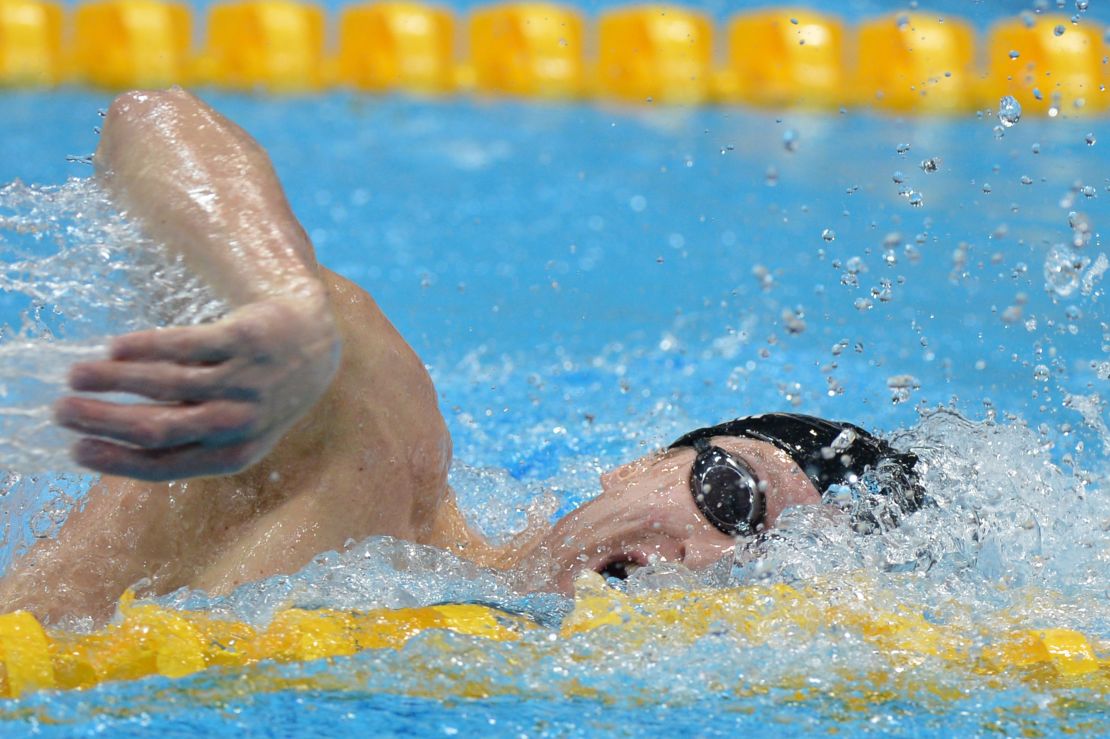Story highlights
Bradley Snyder's life took an unexpected turn after an accident in Afghanistan in 2011
Exactly one year later he won three medals at the 2012 London Paralympic Games
He is now hoping for more gold at the upcoming games in Rio
The fitness and recreation center on the campus of Loyola University in Baltimore, Maryland, sits nearly empty. It’s just before 6am on a Wednesday morning, and you won’t find many college students awake at this time.
But inside the rec center, five lanes of the pool are already occupied.
In the corner of the pool deck, a long-haired German Shepherd named Gizzy keeps a watching eye over practice.
Her main focus is the swimmer in lane 8. Brad Snyder cannot see anymore, but that doesn’t bother him in the water. It is the one place he feels most comfortable. In his words, it is the one place he feels free.
Brad Snyder grew up in St. Petersburg, Florida, the oldest of four children. As a young boy, he idolized his grandfather, a World War II veteran.
One of the riskiest jobs on the planet
“I think I’ve always known that I wanted to be a part of the military,” Snyder said. “From the age of three or four, I remember hanging out with my grandpa down in Florida. That’s what drove me at the beginning was I want to live a life that when I get to be sixty-five, I carry the same amount of respect, or have the same legacy that my grandpa had.”
Snyder viewed the military as a path to that legacy. When it came time to go to college, he aimed high, and was accepted to the United States Naval Academy.
That’s where he first learned about the explosive ordinance disposal, or EOD, unit. It problem-solving nature of the missions attracted him immediately.
It is also one of the riskiest jobs on the planet.
“I saw the scars on my grandpa’s arm. I saw the scars on his forehead,” Snyder said. “I heard those stories. To me, I guess as a kid, that just meant that was a prerequisite for being a hero. To do something admirable, you have to take some level of risk. That risk wasn’t completely understood for quite some time. I had already been deployed to Iraq and back.”
Losing friends in Iraq
“My friend Tyler was killed shortly after I got back from Iraq. Losing a close friend was the first time that I saw it, I felt it, understood it. Tyler didn’t come back. That being said, it didn’t deter me. It just meant that the commitment afterward was something different. It was much more knowing,” he said.
Snyder was deployed overseas twice, first to Iraq, then to Afghanistan. It was there, on September 7, 2011, that the trajectory of his life would change.
“The safest way for us to get from one place to another is me or my partner, the other explosive specialist, taking a metal detector and walking out in front of the patrol looking for these devices everywhere we went,” he said.
“We cleared miles and miles of Afghan terrain between April 2011 and September 2011, with everyone walking in our footsteps behind us. It’s critically important that the guy behind me walks exactly where I walked.”
That faithful day
On that day, it was exactly the opposite that happened. Two of the Afghan Special Forces members with Snyder’s team stepped away from the path that had been cleared.
They stepped on an IED, losing their legs. Snyder and his EOD partner worked to clear another path so the medics could reach them.
“I was running back up to where [my partner] and the medic and the other casualty were when I stepped on another [IED],” Snyder said. “I missed it with my metal detector.”
The hidden improvised explosive device detonated to the front and right of him, instead of directly beneath him, likely saving his life.
“I remember getting knocked back,” he said. “I remember waking up and looking down. I could actually still see out of my left eye at the time. I didn’t see any blood or any damage or anything. The fact that I looked fine, I thought that must mean that I had died.
“Time seemed to go by very, very slowly. I laid there for what seemed like a long time. I had ample time to think through everything. Will I get to see my grandpa again? Will I get to see my dad again? I got really excited about that.”
Air-lifted out of Afghanistan
Suddenly, though, Snyder heard ringing in his ears. The tinnitus had kicked in, bringing him back to reality. He was immediately aware of the damage to his face, where shrapnel had left severe lacerations.
He had sustained a blast, but he was still alive.
Snyder was air-lifted out of Afghanistan. He woke up 60 hours later in Walter Reed Hospital near Washington, DC, surrounded by his family. He had multiple operations on his face and eyes, but the blast caused permanent damage, and blindness.
To reduce risk of infection, doctors decided to remove his eyes, and replace them with prosthetics. Snyder was just 27 years old.
It was a lot to process, but on some level, Snyder said he was actually relieved.
“Sitting in the hospital with that, now it’s no longer a phantom of uncertainty,” he said.
“Now I know what it is. It’s blindness. Everything else is fine. I have ten fingers, ten toes, heart’s fine, no traumatic brain injury or PTSD to speak of. My thing is blindness. I’ve got it now in front of me. I can do this.”
Adjusting to a life in the dark
Snyder began to adjust to life without vision. But he found that those around him were shaken up by the news.
At a barbeque in his honor just a few weeks after being released from the hospital, he came face to face with it.
“It impacted them negatively,” Snyder remembered. “I didn’t like that. I’m used to being the one who can take on the burden for others. I can go out and do great things. I can be a leader. I can be a person who’s going to make the world a better place.
“At that same barbeque, my old swim coach came over and just being the person that he was, he wasn’t one to exist on the past too long, he said ‘great you’re back. When are you coming back to the pool?’ Basically, that’s the way he encounters the world.”
Always a swimmer
Snyder had actually been a competitive swimmer all his life. At the Naval Academy, he was captain of the swim team.
The water was familiar territory for him. And it could be a way to show everyone he was still the same guy. But how different would it be without his vision?

“When I dove in, I found this really cool sense of freedom. This liberation from the burden of this new reality,” Snyder said. “Obviously, life’s going to be different. Every waking moment, I’m now blind. At the beginning, that’s new and it’s exhausting and it’s scary.
“My entire life’s worth of stuff that I take for granted, or I don’t even think about – doing laundry, eating off a plate, choosing what shirt to wear – are now nearly impossible. Swimming wasn’t that way. Swimming was something that I could immediately get in and I feel good at this. I don’t need a guide. I don’t really need adaptive technology.”
The first gold
In competition, blind swimmers use “tappers” – coaches who tap them with a pole as they approach the wall, so they know when to make the turn. In practice, Snyder doesn’t use a tapper. He navigates using the lane ropes, and by counting his strokes. From the beginning, he was good, and he was fast. People began to take notice.
“People were talking about, ‘the world record is in reach,’” Snyder said. “I said, ‘guys, you don’t understand, this is not…you can’t just happen into this. It takes years and years of dedication and hard work and mastering these different techniques that I’m only just now learning. It would be impossible for this to happen.’”
But the timing was right. And against the odds, Snyder qualified for the London Paralympic Games in the summer of 2012. He swam in the finals of the 400-meter freestyle. The date was September 7, 2012 – exactly one year to the day since his injury in Afghanistan.
He won the Gold Medal that day.
“I don’t even believe it sometimes,” Snyder said. “It seems very surreal. Even the memories are very – they seem like something that was put into a movie.”
Snyder left London with two Gold medals and a Silver. Since that time, his life has been a whirlwind.
Will his success continue in Rio?
He’s focusing full-time on training for this year’s Paralympic Games in Rio. He’s also a motivational speaker, has a book coming out, and there’s even a movie in the works about his life.
The athletic brand Under Armour, based in Baltimore where Snyder now lives, signed him to a sponsorship deal last year.
But with everything in his life that’s changed, there is one constant – the positive, hard-working attitude that got Snyder this far. He’s hoping to build on his London 2012 success this year in Rio.
“We love underdog stories because it represents this idea to ourselves that we can overcome,” Snyder said. “We can do things we didn’t think were possible or our community didn’t think were possible. All these things happen in sports. And swimming has been that for me.”














